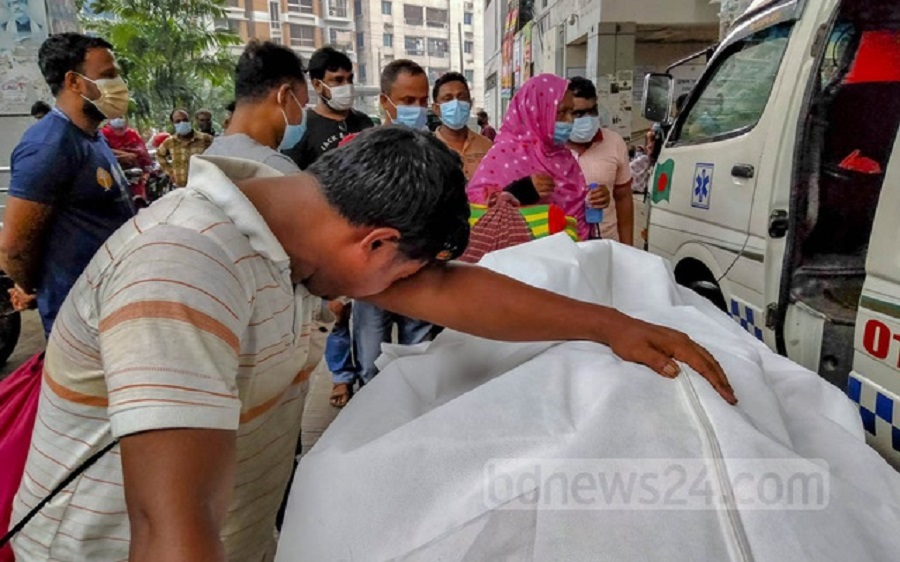
A man is reduced to tears after losing his mother, Amena Begum, to COVID-19 infection. Amena was admitted to Dhaka Medical College Hospital three days ago and passed away on Monday, Jun 21, 2021.
Then came the delta variant.
First detected in India at the tail end of 2020, the new strain spread like wildfire, causing cases and deaths to skyrocket in the neighbouring country and across the world.
Before long, the variant had made its way across the border to Bangladesh, heralding a second wave of the pandemic that shattered all previous records for infections and deaths.
The government launched a mass vaccination programme in February with hopes of curbing the spread of the virus. But the campaign stumbled as stocks ran dry.
Backed into a corner, a series of unprecedented lockdowns were enforced in a bid to stem the tide.
But, as the year draws to a close, the South Asian country seems to have weathered the storm. New infections are down to a few hundred a day and fatalities remain in single digits.

The government says it has administered nearly 110 million doses of the vaccine and measures have been taken to secure doses for those who have not received it.
And yet, there are clouds of uncertainty on the horizon. The emergence of the new ‘omicron’ variant has muddied the outlook for 2022.
Dr Mohammad Shahidullah, president of the National Technical Advisory Committee on COVID-19 (NTAC), says that in his assessment, the delta variant threw the nation into turmoil for the first half of the year, but Bangladesh has been able to overcome the shocks in the last six months.
“The delta variant greatly increased our transmission rate. There have been many deaths. But I think we have dealt with the situation well. The pace at which the vaccination drive has progressed over the past two months will bring us closer to hitting our target in the next three months.”
“The vaccine has protected people as it has created immunity to the coronavirus. This is the key to reducing infections,” he said.
Dr Shahidullah urged those who have not yet been inoculated to get the vaccine so the disease can be contained.
“If we can give booster shots to people over the age of 60, adhere to health restrictions such as wearing masks, then maybe we can survive another disaster.”
A HOPEFUL START, THEN DISASTER
To Bangladesh, 2021 – the golden jubilee of its independence – was a year of hope. The coronavirus pandemic had been on the decline since July 2020.
By February, the number of daily cases dropped, so did the death toll.

But then, on Mar 8, Dr ABM Khurshid Alam, the director-general of health services, declared that returnees from India were carrying the delta variant of the disease.
And suddenly, the pandemic was rampant once again. The positivity rate of COVID tests spiked and, on Apr 9, the country reported over 7,000 new cases of the disease in a day, smashing last year’s record. On Apr 19, the government reported 112 deaths, a daily record at the time.
The delta variant began spreading at the community level. The caseload jumped again at the start of June. Between the first week of July and the middle of August, the coronavirus ran riot, breaking all previous records. On Jul 26, new cases peaked with 16,230 infections in a day. On Aug 5 and Aug 10, the daily death toll hit 264.
From Jul 1, the nation went into lockdown to try and contain the disease. The lockdown was extended several times as the situation continued to worsen. There was, however, a nine-day easing of restrictions for Eid-ul-Azha.
By Sept 30, daily infections had drifted below 1,000 and, on Oct 4, it dropped below 500. As of Dec 28, the daily virus count has not passed 500 again. Fresh cases have stayed below 400 since Oct 19.
Alongside the drop in cases, there has also been a dwindling of daily deaths. Fatalities have not crossed single digits since Oct 22.
Bangladesh even experienced two days free of COVID deaths on Nov 20 and Dec 9.
The positivity rate has also largely remained below 2 percent since Oct 5.
THE NEW OMICRON THREAT
In the last week of November, South African scientists reported the discovery of a new coronavirus variant, now called omicron and designated as a ‘variant of concern’ by the World Health Organization.

But this new variant is likely not as severe as delta. Scientists say those infected with the strain are experiencing relatively mild symptoms and the WHO has advised people not to panic.
However, omicron has moved quickly, spreading to about 60 countries across the world, including the United States, the United Kingdom and India.
The NTAC recommended banning travellers from the countries where the new variant was reported.
The government has also mandated a 14-day institutional quarantine for travellers coming from seven African countries where the variant was found.
Despite this, omicron, like delta, found its way into Bangladesh.
On Dec 1, Health Minister Zahid Maleque announced at an event that the first cases of omicron had been detected in two women cricketers who returned home after a successful World Cup qualifying campaign in Zimbabwe.
The two patients are doing well, Maleque said, adding no other cases of the omicron variant have been detected thus far.
VACCINATION HOPES
The government has been working since last year to secure the COVID vaccine and inoculate Bangladeshis against the coronavirus infection.

Relatives pray for a person, who died from COVID-19, after the burial at Rayerbazar Graveyard in Dhaka after Jum’a prayers on Friday, Jul 16, 2021. Photo: Mahmud Zaman Ovi
On Nov 5, 2020, the government signed an agreement with the Serum Institute of India and Beximco Pharmaceuticals Ltd to import the Oxford-AstraZeneca vaccine.
Under the agreement, Bangladesh was supposed to receive 30 million doses of the vaccine in six consignments.
The first shipment arrived on Jan 21. On that day, Bangladesh received two million doses of the vaccine for free as a goodwill gesture by the Indian government. The second shipment, another gift of 1.2 million doses, arrived on the 50th anniversary of independence, on Mar 26.
Five million doses arrived in the first shipment of vaccines purchased by the Bangladesh government on Jan 25. The second consignment, another two million doses, arrived on Feb 23.
And then it ground to a halt. The Indian government, overwhelmed by a devastating second wave of infections and deaths spurred on by the delta variant, suspended all exports of the vaccine.
The shipments stopped coming and Bangladesh was left with a total of 10.2 million doses in purchases and gifts.
As a result, the mass immunisation programme that launched on Feb 7 was thrown off the track. The government stopped administering the first dose on Apr 25 to save shots for the second dose.

A view of Shaheed Suhrawardy Medical College Hospital’s coronavirus isolation unit for men on Saturday, Oct 30, 2021. Photo: Asif Mahmud Ove
Eventually, the stock ran out and the government was forced to halt the vaccination programme altogether.
Bangladesh then turned to China and its newly developed vaccines.
On May 12, half a million doses of the Sinopharm vaccine arrived in Bangladesh as a gift from China.
On Jun 1, the country received another 100,620 doses of the Pfizer-BioNTech vaccine through the international vaccine cooperative COVAX.
Finally, after a delay of two months and seven days, Bangladesh was able to relaunch its inoculation drive on Jul 1.
To speed up the vaccination effort, the government started mass immunisation drives. A six-day programme to administer doses at the union level opened on Aug 7. On the first day of the programme, approximately 2.8 million people received their first dose.
On Jun 29, more than 6.6 million doses of the coronavirus vaccine were administered under a special inoculation drive to mark Prime Minister Sheikh Hasina’s birthday.
According to the Directorate General of Health Services, Bangladesh has already administered 109,267,577 doses of the COVID vaccine. The first dose was administered to 66,514,886 people, while 42,752,691 received a second dose.
The government has received 150,084,427 doses of the coronavirus vaccine as of Dec 11.
Of these, 29,008,070 doses are of the Oxford–AstraZeneca vaccine, 11,480,040 doses of Pfizer-BioNTech, 7,958,860 doses of Moderna, 92,811,457 doses of Sinopharm, and 8,826,000 doses of Sinovac.

The government plans to vaccinate 80 percent of the country's population, some 138,247,508 people, which will require about 280 million doses of the vaccine to administer a double dose each.
The DGHS says the government still has 40 million COVID doses at hand.
Following the deal with India, Bangladesh has, so far, bought vaccines from China, the United States and the United Kingdom. Some countries, including Japan, have also gifted Bangladesh with vaccines.
VACCINE APPROVAL
Bangladesh has approved several vaccines for the fight against coronavirus.

The Oxford-AstraZeneca vaccine 'COVISHIELD' was the first to be approved by the Directorate General of Drug Administration, getting the nod on Jan 8.
This was followed by Russia's Sputnik-V on Apr 27, China's Sinopharm on Apr 29, Pfizer-BioNTech on May 27, Sinovac of China on Jun 6, Johnson & Johnson on Jun 16, and vaccines from the Institute of Medical Biology Chinese Academy of Medical Sciences (IMBCAMS) on Jun 24.
On Aug 16, the Bangladesh government and Incepta Vaccine Limited entered into a tripartite agreement to package and supply the coronavirus vaccine made by the Chinese company Sinopharm in Bangladesh.
Under the deal, Incepta will bring over vaccines from China in bulk, and put them in vials and label them. The government will then buy the vaccines from Incepta.

Bangladeshi company Globe Biotech Limited is also in the process of rolling out a vaccine against the coronavirus.
Their Bangavax COVID-19 vaccine has received ethical clearance for an experimental trial but is still awaiting final approval.
Developed by the local pharmaceutical company, Bangavax is set to become the first experimental vaccine to be used on humans in Bangladesh.
Bangladesh begins administering booster doses of the COVID-19 vaccine in Dhaka from Tuesday amid a rise in omicron cases around the world.




